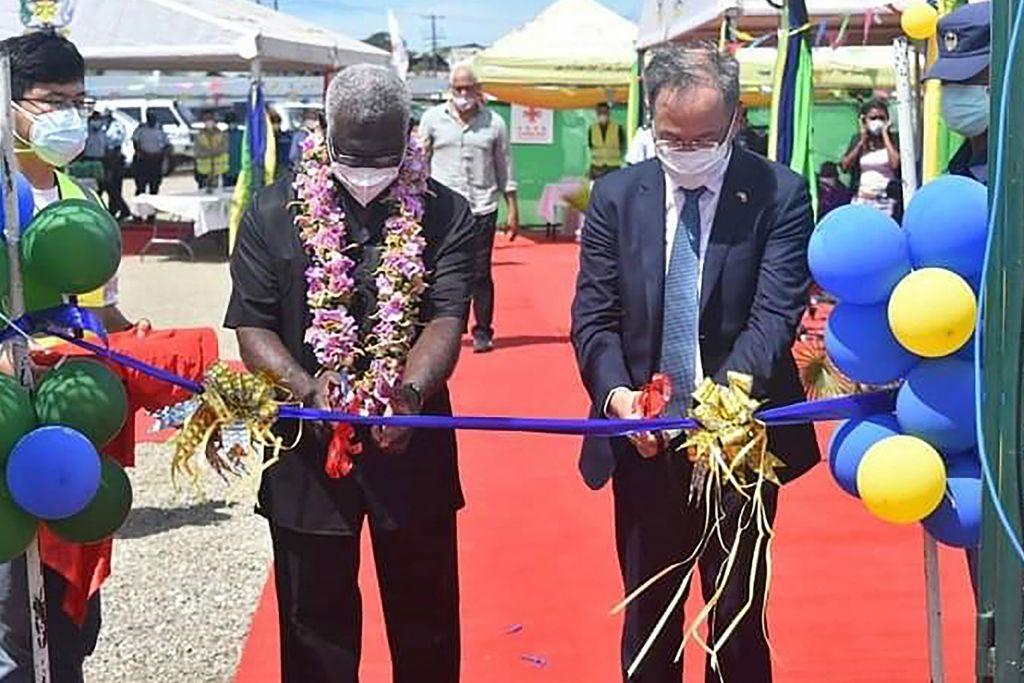
The leaked Solomon Islands – China security deal has sent shockwaves across the Pacific. Australia, the US, Fiji, Papua New Guinea and the Federated States of Micronesia have already expressed their concerns about the risk of a future Chinese military presence in Solomon Islands. Regional leaders will have further opportunities to discuss the potential implications at next month’s Pacific Islands Forum leaders’ meeting.
But a military base in Solomon Islands, or elsewhere in the Pacific, isn’t the only goal for the Chinese Communist Party. It wants to create a region that reflexively defers to its interest, ultimately at the cost of the Pacific islands’ other relationships and needs. Part of this strategy involves shaping the public discourse in the region through an online information campaign aimed at building trust in China while undermining relationships with traditional partners such as Australia and the US.
In Solomon Islands, the CCP has sought to capitalise on recent instability and unease to push narratives that support the party’s regional objectives. Following the riots in Honiara in November, the CCP accused Australia, the US and Taiwan of instigating the unrest—without offering any evidence to support its allegations.
In the month following the riots, CCP state media, primarily led by the Global Times, published at least 10 articles making these accusations. One opinion piece stated, ‘The US must have played a major role in the recent Solomon Islands riots’, before concluding that the US was ‘very likely’ to have been responsible for Australia’s decision to send peacekeeping support, declaring it ‘blatant military intervention’. But China’s approach to information operations in the region is evolving in its sophistication and coordination.
CCP representatives have been active in spreading this message in Solomon Islands. This includes statements from Chinese Ambassador to Solomon Islands Li Ming in local news outlets, and a claim from Foreign Minister Wang Yi in discussion with Solomon Islands Foreign Minister Jeremiah Manele that ‘foreign forces with ulterior motives took the opportunity to smear the relationship between China and Solomon Islands’. Similar comments blaming foreign powers for instigating the riots were also made by Prime Minister Manasseh Sogavare, though no country was named. Circulated by local media, these messages penetrate deeper into the Solomon Islands’ information ecosystem and shape public discourse more effectively than CCP state media alone.
Since the leaking of the draft security agreement in March, state media has been active again, signalling the kind of message CCP officials are likely to be spreading behind the scenes. The Global Times has published more than a dozen articles—in addition to previous reporting on the riots—criticising the response from Australia and the US, characterising it as threatening, bullying, patronising and arrogant. China is seeking to again undermine Solomon Islands’ partnerships with these countries by portraying Australian and US interests in the region as ingenuine.
ASPI’s International Cyber Policy Centre is conducting an in-depth analysis of the CCP’s information influence activities in Solomon Islands. Despite initial indications that CCP narratives aimed at undermining Australia and the US had low penetration through social media and little immediate effect on population sentiment, its impact may be felt over a longer term and warrants further observation.
In the meantime, Australia needs to step up its efforts in countering Chinese information operations in the region or else run the risk of playing into the CCP’s narratives.
On the same day the security agreement was leaked, Australia and Solomon Islands announced the construction of a second patrol boat outpost on the Solomons’ eastern border, an integrated disaster management radio network and additional budgetary support to mitigate the financial impact of Covid-19. Although the timing of their announcement is unlikely to be coincidental, these initiatives have clearly been months, if not years, in development.
This is something worth talking about and celebrating. It demonstrates an act of genuine partnership. Unfortunately, the value of these initiatives has been lost in a sea of noise, alongside Australia’s assistance in maintaining stability following the riots. Australian High Commissioner Lachlan Strahan’s recent piece in the Solomon Star served as a small reminder of the value of Australia’s partnership. But it will be a drop in the ocean of positive press likely to flow from Wang’s trip to Solomon Islands in the coming weeks and the anticipated maritime development announcements.
ASPI’s analysis also shows that most of the Australian articles shared by Solomon Islands’ media in the past month came from outlets focused on framing the event as an Australian election issue. In the region, this can be easily framed as Australia only showing interest in the Pacific to counter China, with decades of ongoing assistance easily forgotten.
The republication of Australian media content locally is usually valued across the Pacific. But we should also be aiming to produce content that is relevant to the Pacific people. ASPI’s Graeme Dobell has outlined why and how Australia needs to rebuild its regional media presence. Hopefully in doing so, Australia can also learn to avoid simple mistakes, such as using terms like ‘backyard’ that paint an inconsiderate picture of our neighbourhood and play into the CCP narrative about patronising Western partners.
Securing a military presence in the Pacific isn’t the only way China can undermine regional partnerships, create instability and influence decision-making. Australia needs to continue to step up on all fronts to counter the CCP’s regional agenda.